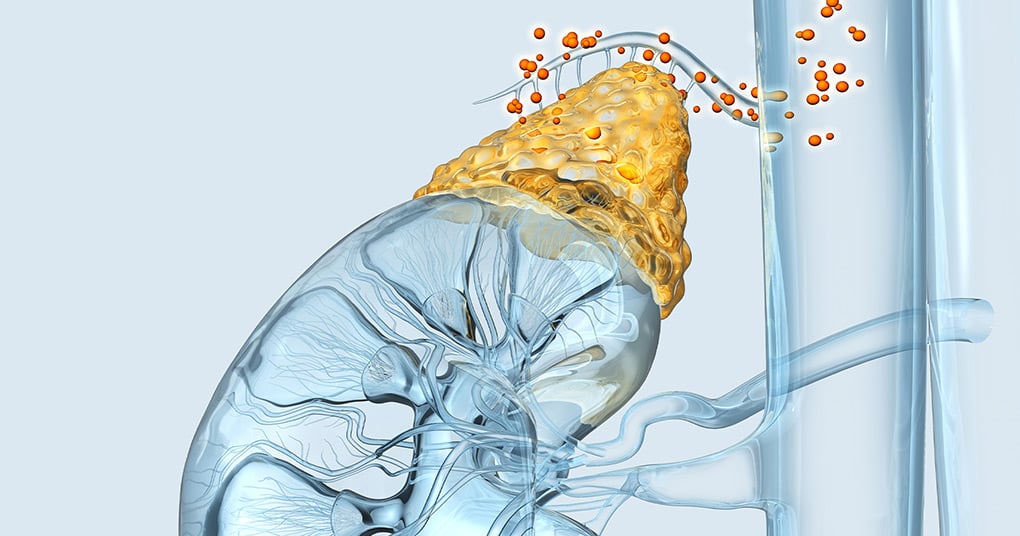Adrenal Fatigue: Why the Story Sounds So Right—But Isn’t Quite True
Feeling drained even after a full night’s sleep? Struggling with brain fog, low motivation, and that constant sense of being “on empty”? Many people in this state stumble upon an explanation that feels just right: adrenal fatigue. The theory says chronic stress wears out your adrenal glands until they can’t keep up, leaving you chemically exhausted. It’s a tidy story and a tempting one. Yet science paints a different picture.

Adrenal Glands: Small Organs, Big Work
The two tiny powerhouses that sit atop your kidneys are your adrenal glands.Despite their small size, they control many different hormones, including cortisol, sometimes referred to as the "stress hormone." Cortisol controls everything from blood sugar and mood to inflammation and metabolism.
When life gets hectic, tight deadlines, restless nights, emotional turmoil your adrenals release bursts of cortisol to help you stay sharp. Once the crisis ends, your levels drop back to normal.
The idea behind “adrenal fatigue” is that constant stress never lets that system rest, supposedly wearing out the glands until they can’t make enough cortisol. You’re left feeling weak, foggy, and emotionally flat. It’s a convincing tale because it mirrors how modern life feels. Yet, as neat as it sounds, there’s a big problem: biology doesn’t quite back it up.
What the Science Actually Shows
Endocrinologists doctors who study hormones have looked closely at adrenal fatigue. The consensus? It doesn’t exist as a recognized medical condition.
The Endocrine Society and multiple scientific reviews have combed through decades of research. One major review examined 58 studies and found no consistent evidence that people with “adrenal fatigue” had abnormally low cortisol. Whether tested through saliva, blood, or urine, cortisol levels looked remarkably similar to those of healthy participants.
That doesn’t mean your exhaustion isn’t real. It simply means your adrenal glands aren’t the villain. Something else is going on.
If It’s Not Adrenal Fatigue, What’s Causing the Exhaustion?

Fatigue is a symptom, not a diagnosis. Many health conditions physical and psychological can cause it.It is important to rule out actual medical conditions like these before trusting an internet theory:
Low iron or anemia
Poor sleep quality or sleep apnea
Thyroid conditions
Autoimmune diseases
persistent infections
Diseases of the heart, kidneys, or liver
Chronic tension, worry, or depression
Side consequences of medication or substance abuse
The role of your doctor is to investigate, not to speculate. By identifying the underlying problem, a comprehensive medical examination might save you from needless supplements or unrealistic expectations.
When All Test Results Are "Normal," But You Still Feel Horrible
It can be frustrating to hear "everything looks OK" when you do not feel well at all. This is where holistic care, self-awareness, and lifestyle come into play. Frequently, your life rhythm is out of sync rather than your glands.
Start here, if you can:
Get a good night's sleep. Setting a consistent sleep routine, keeping the room cold and dark, and unplugging before bed are all necessary for getting a good night's sleep.
Feed your body, not your cravings. Focus on balanced meals rich in protein, fiber, and healthy fats. They keep blood sugar and energy steady.
Move a little, often. Gentle exercise walking, yoga, stretching can reboot your metabolism and mood without draining your reserves.
Tend to your mind. Chronic stress and emotional overload are fatigue factories. Mindfulness, deep breathing, or even talking to a counselor can help quiet the noise.
Find a doctor who listens. Longer, more holistic visits often offered by integrative medicine practitioners can help craft a plan that actually fits your life.
Beware of Quick Fixes and “Adrenal Reset” Promises
A quick scroll through the internet will serve up “adrenal support” supplements, saliva cortisol tests, and pricey “rebalancing protocols.” Most lack solid evidence. Even worse, some practitioners prescribe cortisol-like drugs without confirming adrenal insufficiency, a move that can backfire badly.
Excess cortisol can lead to weight gain, bone thinning, high blood sugar, and heart problems. If anyone promises to “heal your adrenals” with a miracle cure, take that as your cue to walk away.
The Real Path Forward
Chronic fatigue doesn’t belong to one diagnosis, it's a puzzle made of stress, sleep, diet, and emotion. The solution is rarely a pill. It’s patience. It’s pacing yourself. It’s taking small, consistent steps toward balance.
Science may not support the term adrenal fatigue, but it does support you-your symptoms, your frustration, and your desire to feel alive again.
When you learn to listen to your body instead of resisting it, healing begin
Bottom Line
There’s no solid proof that adrenal fatigue exists as a distinct medical disorder. Still, millions of people feel the exhaustion it describes. Instead of chasing unproven “adrenal” cures, focus on sustainable habits: sleep well, eat wisely, move gently, and seek a doctor who takes your experience seriously.
Because healing isn’t about fixing a broken gland it’s about restoring a life that’s been running on empty.
What's Your Reaction?




















